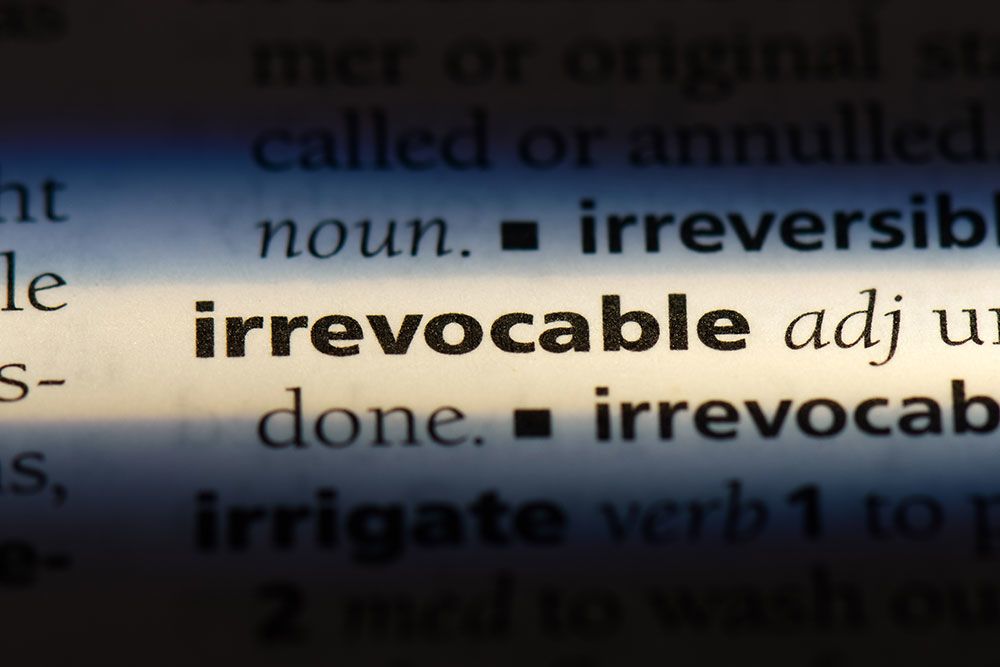Modifying Irrevocable Trusts in North Carolina: What You Need to Know

Irrevocable trusts, by design, are meant to remain unchanged. However, life’s unpredictability and evolving legal landscapes can sometimes necessitate alterations. More commonly, at the death of a revocable or “living” trust’s creator, their trust immediately becomes irrevocable. In addition, trusts created under a person’s last will and testament (testamentary trusts) are likewise irrevocable, coming into existence upon the creator’s death. If you’re considering modifying an irrevocable trust in North Carolina, here are some considerations to help you navigate the process.
Understanding Irrevocable Trusts
Irrevocable trusts can be established in several ways. The most common occurrence is upon the death of the creator of a revocable living trust. Wealthier individuals frequently use irrevocable trusts to transfer assets to descendants or other family members. Trusts created under a person’s last will and testament, for the benefit of minor children or surviving spouses, for example, also constitute irrevocable trusts.
Why Modify an Irrevocable Trust?
The beneficiaries to an irrevocable trust may find it desirable, and economical, to modify, or even terminate, an otherwise irrevocable trust. For example, what if the trust’s assets are not producing sufficient income or do not contain sufficient liquid assets to support the costs and expenses of maintaining the trust? North Carolina Gen. Stat. § 36C-4-414 provides a mechanism to terminate this kind of “wasting trust” or an otherwise uneconomic trust.
Scrivner’s errors made by a trust instrument’s drafter also support the modification of an irrevocable trust. Modifications are also permissible to correct technical mistakes contained somewhere within the text of the trust instrument.
Over time, the objectives that led an otherwise irrevocable trust’s creator to establish the trust may be frustrated by an unforeseeable change in circumstances. In other cases, changes in tax laws may frustrate the trust’s creator’s original tax objectives. Perhaps the trust was intended to reduce a family’s exposure to federal estate tax, for example. Older irrevocable trusts, especially formerly revocable living trusts established prior to 2010, may inadvertently trigger the recognition of capital gain at the death of a beneficiary. A trust modification to permit the beneficiary to have a general power of appointment over an irrevocable trust’s assets may result in a step-up in basis in the trust’s underlying assets, thus averting the assessment of a capital gain tax on the subsequent sale of the trust’s assets after the beneficiary’s death.
Ways to Modify an Irrevocable Trust in North Carolina
Under the North Carolina Uniform Trust Code, there are specific scenarios where irrevocable trusts can be revised:
Modification by Mutual Consent:
As per North Carolina General Statutes § 36C-4-411, all involved parties can agree in writing to modify a trust.
This method requires consent from the grantor, trustee, and all beneficiaries, which can be challenging when minors or incapacitated beneficiaries are involved. However, if the grantor is deceased, modification by mutual consent is unavailable.
Judicial Amendment through Court Order:
North Carolina courts can amend irrevocable trusts under certain conditions, as outlined in N.C. Gen. Stat. § 36C-4-412.
Courts typically avoid infringing on beneficiary rights.
Decanting:
This involves transferring assets from one trust to another with more preferable terms, such as the grant of a general power of appointment to avoid capital gain recognition.
Decanting is often used to address changes in tax laws or special needs provisions.
It’s essential to ensure decanting doesn’t compromise the original trust’s intent.
Termination of an Uneconomical Trust:
Under North Carolina’s Uniform Trust Code, a trustee may terminate a trust with asset values below $50,000. However, the cost and expense of maintaining an irrevocable trust can make trusts with even higher asset balances uneconomical. Trusts may be modified to give the trustee the power to terminate an uneconomical trust at the trustee’s discretion, even if the asset value exceeds $50,000. The ability to modify an irrevocable trust under these circumstances can mitigate the chances that a trust will become or continue to be a “wasting trust,” one in which the assets and income of the trust do not support the cost of its ongoing upkeep.
Role of a Trust Protector:
Some trusts appoint a trust protector, an independent individual authorized to make specific revisions, usually limited to administrative provisions. Ideally, the attorney drafting the trust would include the appointment of a trust protector. In North Carolina, a trust protector acts under a fiduciary duty. The trust protector can be granted certain powers (as determined by the trust’s creator or through modification). Those powers may include the power to terminate the trust, the power to remove and appoint successor trustees, and the power to grant additional powers (such as general powers of appointment to beneficiaries).
Considerations Before Modifying a Trust
Modifying an irrevocable trust is a significant decision with potential tax implications. It’s crucial to consult with competent estate planning counsel to avoid unintended tax consequences and ensure any changes conform to North Carolina’s strict requirements for modifications and terminations of irrevocable trusts. The legal requirements to judicially modify a trust are highly technical and complex. Because of North Carolina’s prohibition on the unauthorized practice of law, non-attorneys are prohibited from representing a trust or other beneficiaries before a court. Therefore, do your research and choose your counsel wisely.
Expertise at North Carolina Estate Planning & Fiduciary Law
Our team, led by Board Certified Specialist in Estate Planning and Probate Law, Jim Hickmon, offers over 20 years of experience in comprehensive estate planning. We’re dedicated to ensuring your estate planning documents align with your goals. For tailored advice on estate planning, contact us at (704) 248-6325 or Email Us at Info@charlotteestatelawyer.Com today.